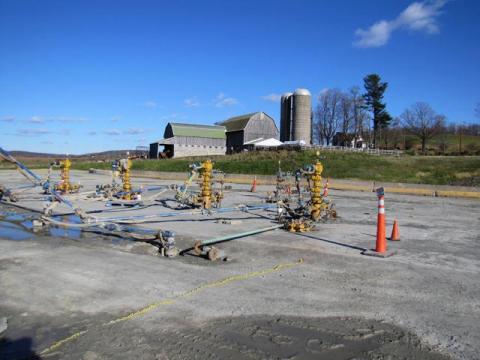
A key aspect of the ShaleNetwork is the involvement of Kathy Brasier, Associate Professor of Rural Sociology at Penn State. Brasier’s current research program tracks short- and long-term social impacts of Marcellus Shale development on individuals, families, social institutions, and communities. This research uses both quantitative and qualitative data collection techniques to identify early impacts of development as well as establish baseline conditions for future longitudinal comparisons. Specific changes being tracked include individual satisfaction with and attachment to their communities, impacts on the well-being of individuals and families, impacts on social networks and support systems, perception of the risk associated with Marcellus Shale development, trust in the industry and institutions involved in the research and regulation associated with development, and responses to development by individuals (such as information seeking and advocacy) and groups of people (development of groups for monitoring, task forces, etc.).
Brasier also brings experience from previous research that examined the formation, activities, accomplishments, and challenges of community watershed organizations in Pennsylvania (Brasier et al. 2011; Higdon et al. 2005; Stedman et al. 2009). Brasier found that participation in community watershed organizations not only impacts the ecological conditions but also the community capacity in watersheds. Volunteers enhance their knowledge and skills related to the ecology of the region, ecological and hydrological scientific techniques, and leadership. In so doing, they become critical resources for both their organizations and their communities. Brasier’s community watershed research (undertaken with separate funding from the current proposal) will provide a foundation for assisting the RCN.
Brasier’s involvement in the RCN is particularly important given the history of resource extraction in Appalachia has resulted in communities with persistent social problems and limited capacity to address major challenges (Duncan 2000; Kroll-Smith and Couch 1990). Efforts to provide individuals with the scientific knowledge they need to appropriately assess ecological and hydrological change has the potential to increase feelings of empowerment and facilitate enhanced engagement in public dialogue about social and ecological issues. Further, the development of the network increases the personal networks of volunteers conducting the monitoring, networks which further enhance their knowledge, skill sets, and capacity to address ecological issues in their own communities. To assess whether the Shale Network contributes to these goals, Brasier will develop and conduct an evaluation with participating volunteers and their organizations.
Finally, it is hoped that the Shale Network will lay the groundwork for a monitoring approach that can track impacts of Marcellus Shale development across multiple ecological, social, and economic attributes of the region. Although this RCN focuses specifically on water quality monitoring, the learning that occurs due to the RCN will establish a foundation for future tracking of other data such as flora/fauna species counts, air quality, and socioeconomic conditions (i.e., population, poverty, etc.). This kind of effort can establish a foundation for long-term monitoring of the social and ecological integrity of the region and provide the opportunity to examine systemic and cumulative impacts as well as scalar and non-scalar effects.
Related experiences and projects
Brasier is also engaged in education and outreach efforts through Penn State Cooperative Extension. In addition to making research findings available through presentations and publications, Brasier has focused on improving the public dialogue about Marcellus. To do this, she has two areas of focus. First, she has received funding that will be used to increase the capacity of Extension personnel to facilitate such dialogue. Second, she has developed a curriculum (“Dealing with Difficult Issues”) which is offered to community and organizational leaders throughout the state.
Susquehanna Basin Transition Zone (T-Zone): Brasier is also co-PI (PD: J. Findeis) on a project funded by the USDA to examine farm transitions within the Susquehanna Basin. The intent is to examine the spatial patterns of landscape change associated with land use transitions, especially those related to farming. There are two main components of the project. The first is to develop a spatial database that describes historical landscape change in the region, beginning with photos from flyovers in the 1930s through present day. The second main component is a survey of farmers in the Susquehanna Basin to assess the likelihood of farm transitions (whether selling the farm for development or for agriculture, making major changes in production practices or products, or enrolling in farmland preservation or other programs). Farmers are sampled by watershed, for which we will have the historical spatial database to understand the landscape context in which farmers are making transition decisions. Ultimately, it is expected that this work will identify areas in which farm transitions are currently happening and where they are likely to happen; future research is planned that will examine the ecosystem services impacts of these transitions.
USDA Multi-State Project: Brasier is the Penn State representative to a USDA multi-state project entitled, “Catalysts for Water Resources Protection and Restoration: Applied Social Science Research.” The intent of this project is to develop a network of scientists that will be poised to engage in collaborative opportunities such as publications and grant proposals.